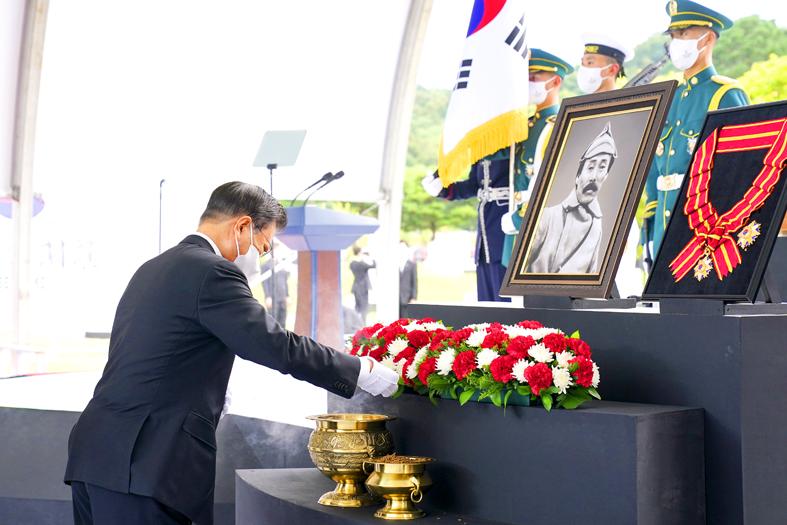Japan yesterday warned of “serious” ramifications if a South Korean court ruling to seize assets of Mitsubishi Heavy Industries Ltd as compensation over colonial-era forced labor is enforced.
The families of four South Koreans who were forced to work for Mitsubishi during the 1910-to-1945 Japanese colonial rule this month filed a lawsuit to seize about 853 million won (US$725,000) owed by a South Korean firm to the Japanese company.
The South Korean Supreme Court in 2018 ordered Mitsubishi to compensate the victims, but the company has not done so amid a diplomatic feud between the two countries, with Japan arguing that the matter was settled under a 1965 treaty.

Photo: EPA-EFE
Seoul and Tokyo have long been at odds over restitution for South Koreans forced to work in Japanese firms and military brothels during the colonial era.
Relations have soured to their lowest ebbs in decades, as the row over forced labor spilled into a trade dispute, and rekindled history and territorial spats.
The Suwon District Court late on Wednesday approved the seizure, banning the Korean company from paying the money to Mitsubishi and allowing the victims to collect it.
The verdict drew a strong rebuke from Japan, with a government spokesman calling for Seoul to act to resolve the dispute.
“If it’s liquidated, that would push Japan-South Korea relations into a serious situation. It must be avoided,” Japanese Chief Cabinet Secretary Katsunobu Kato told reporters. “We want to urge South Korea even more strongly to present a solution that is acceptable to Japan.”
The South Korean Ministry of Foreign Affairs said that it has been in talks with Japan to find a “reasonable solution” while considering how the victims can exercise their legal rights, as well as diplomatic relations.
A Mitsubishi spokesperson declined to comment, saying that the company was trying to confirm details on the ruling.
Lawyers for the victims said that if the Japanese company continues refusing to implement the order, they would directly collect the funds from the Korean company, LS Mtron Ltd.
“The victims and their families demand Mitsubishi make compensation in line with the ruling, acknowledge historical facts and provide an apology,” the lawyers said in a statement, adding that their clients are “open to consultations on this.”
An official at LS Mtron, a machinery subsidiary of LS Corp, told Reuters that it shares the pain suffered by the victims and would follow the court decision, but needs to verify details.
Last month, South Korean President Moon Jae-in scrapped a plan to visit Tokyo for the Olympic Games and hold his first summit with Japanese Prime Minister Yoshihide Suga amid controversy over remarks by a Seoul-based Japanese diplomat.
Moon, marking the anniversary of his country’s independence from Japan on Sunday, said that his government remained open to dialogue with Japan to resolve problems.

CAUTIOUS RECOVERY: While the manufacturing sector returned to growth amid the US-China trade truce, firms remain wary as uncertainty clouds the outlook, the CIER said The local manufacturing sector returned to expansion last month, as the official purchasing managers’ index (PMI) rose 2.1 points to 51.0, driven by a temporary easing in US-China trade tensions, the Chung-Hua Institution for Economic Research (CIER, 中華經濟研究院) said yesterday. The PMI gauges the health of the manufacturing industry, with readings above 50 indicating expansion and those below 50 signaling contraction. “Firms are not as pessimistic as they were in April, but they remain far from optimistic,” CIER president Lien Hsien-ming (連賢明) said at a news conference. The full impact of US tariff decisions is unlikely to become clear until later this month

GROWING CONCERN: Some senior Trump administration officials opposed the UAE expansion over fears that another TSMC project could jeopardize its US investment Taiwan Semiconductor Manufacturing Co (TSMC, 台積電) is evaluating building an advanced production facility in the United Arab Emirates (UAE) and has discussed the possibility with officials in US President Donald Trump’s administration, people familiar with the matter said, in a potentially major bet on the Middle East that would only come to fruition with Washington’s approval. The company has had multiple meetings in the past few months with US Special Envoy to the Middle East Steve Witkoff and officials from MGX, an influential investment vehicle overseen by the UAE president’s brother, the people said. The conversations are a continuation of talks that

CHIP DUTIES: TSMC said it voiced its concerns to Washington about tariffs, telling the US commerce department that it wants ‘fair treatment’ to protect its competitiveness Taiwan Semiconductor Manufacturing Co (TSMC, 台積電) yesterday reiterated robust business prospects for this year as strong artificial intelligence (AI) chip demand from Nvidia Corp and other customers would absorb the impacts of US tariffs. “The impact of tariffs would be indirect, as the custom tax is the importers’ responsibility, not the exporters,” TSMC chairman and chief executive officer C.C. Wei (魏哲家) said at the chipmaker’s annual shareholders’ meeting in Hsinchu City. TSMC’s business could be affected if people become reluctant to buy electronics due to inflated prices, Wei said. In addition, the chipmaker has voiced its concern to the US Department of Commerce

STILL LOADED: Last year’s richest person, Quanta Computer Inc chairman Barry Lam, dropped to second place despite an 8 percent increase in his wealth to US$12.6 billion Staff writer, with CNA Daniel Tsai (蔡明忠) and Richard Tsai (蔡明興), the brothers who run Fubon Group (富邦集團), topped the Forbes list of Taiwan’s 50 richest people this year, released on Wednesday in New York. The magazine said that a stronger New Taiwan dollar pushed the combined wealth of Taiwan’s 50 richest people up 13 percent, from US$174 billion to US$197 billion, with 36 of the people on the list seeing their wealth increase. That came as Taiwan’s economy grew 4.6 percent last year, its fastest pace in three years, driven by the strong performance of the semiconductor industry, the magazine said. The Tsai